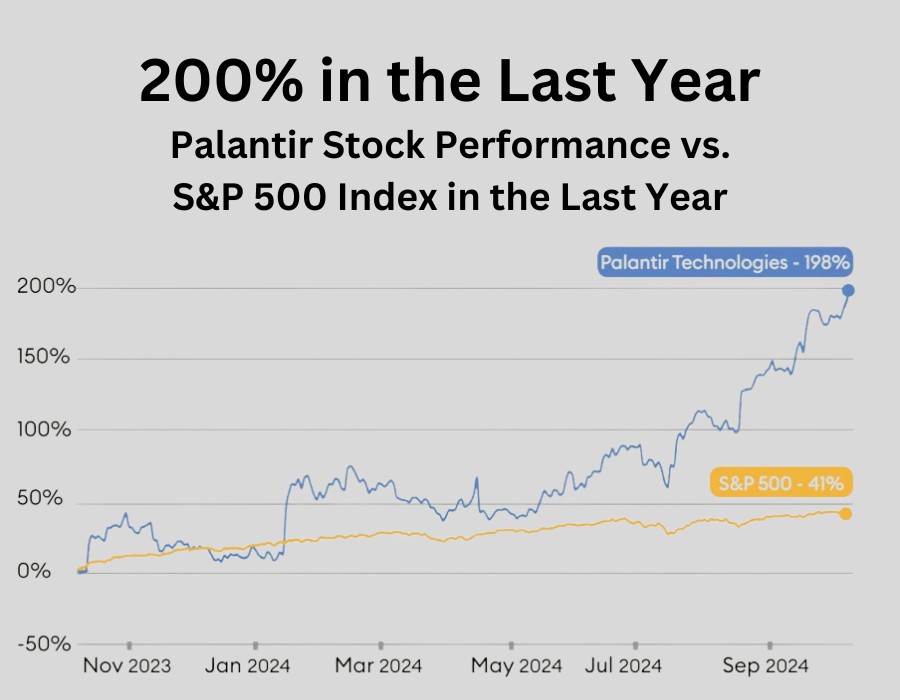To tell the truth, it’s quite rare to find foreign global companies operating in Israel that, specifically in a year of war, choose to deepen their local activity in Israel, strengthen ties with Israel, and even declare it publicly. It’s even rarer when it involves one of Silicon Valley’s most mysterious companies, which even in normal times takes care to maintain distance from the spotlight.
But this is exactly the case with Palantir Technologies, the global data giant, one of the most valued AI and data companies, which has shown phenomenal growth in recent years and grown to a value of tens of billions of dollars – and whose executives have been declaring in the past year, almost from every possible platform, unqualified support for Israel.
Take Alex Karp, CEO and founder of the company, which he established about two decades ago together with serial entrepreneur and investor Peter Thiel. Karp, whom the data business has turned into a billionaire, frequently visits Israel and hasn’t skipped a trip to the Holy Land even in a year of difficult war.
Recently, the “genius entrepreneur,” son of a Jewish doctor from Philadelphia, has become one of the industry’s most passionate speakers and supporters of Israel. “We support Israel in every possible way,” he declared several times this year and proudly shared how within weeks of the war’s outbreak, his company was already collaborating with security bodies in Israel and was involved in operational activities in the field.
“On October 7, before we even understood what was happening here, I already received a phone call from the CEO,” describes Ayelet Gilan, general manager of Palantir Israel and the person responsible for the global data giant’s local operations in recent years. “And he doesn’t call me personally every day,” she admits.

In an interview with Forbes Israel that we conduct in the company’s offices in one of Tel Aviv’s office towers, she speaks about the dramatic conversation in those critical hours: “He saw ahead and immediately understood what was happening,” she recalls. “In that conversation, he had one request for me: ‘try to understand how we can help Israel'”
Karp, perhaps somewhat ironically for such a senior figure standing at the head of a mysterious data giant, doesn’t tend to keep things to himself. He frequently shares his views about the importance of the connection with Israel in interviews he conducts regularly with media outlets and doesn’t hesitate to sharply criticize corporate America.
What exactly does the company do? Forbes defined it this way: “Palantir turns messy swamps of information into intuitively visualized maps, histograms and link charts.”
“As far as I can tell, there are only three companies that have been publicly pro-Israel on Oct. 7,” Karp confronted senior executives in the business sector, and in an interview with CNBC described the price the company pays for its public support of the Israeli side. “We’ve lost employees, I’m sure we’ll lose employees,” he said “If you have a position that does not cost you ever to lose an employee, it’s not a position.”
Board Meeting in Tel Aviv
But it doesn’t seem like this will stop him or harm Palantir’s operations here in any way. On the contrary. At the beginning of this year, in a rare show of solidarity with Israel, the global company, with all its senior executives present, chose to hold its first board meeting of 2024 in Tel Aviv. Shortly after, a meeting was held between Palantir’s two most senior figures, CEO Karp and Chairman Thiel, with senior IDF officials, after which they announced the signing of a strategic cooperation agreement between the parties.
“Last month, the board of directors of Palantir hosted its first meeting of 2024 in Tel Aviv”, was written in the first pages of the company’s report published for the year’s summary. “Following that meeting, Palantir agreed to a strategic partnership with the Israeli Ministry of Defense to supply Palantir technology to help the country’s war effort. We are proud to stand alongside Israel, supporting a culture of innovation, technology, and democracy”, was written there in large letters.
This is the strongest statement there is,” Gilan asserts decisively, enthusiastically describing Palantir’s initiatives to support the families of hostages and other efforts to raise international awareness of the issue.

The company published a large-scale support advertisement in The New York Times and publishes comprehensive declarations of support for Israel in all its financial reports since October 7. “To the best of my knowledge, there is no multinational company, certainly not of this size, that has expressed such strong and clear support for Israel,” she adds.
According to Palntir-Israel, “The support for Israel doesn’t stem from business motives but from a worldview,” emphasizing that its support for Israel is “disconnected from any business considerations”. “Palantir expressed its support for Israel long before it signed a deal in Israel and continues to do so despite harsh public criticism from anti-Israeli elements abroad, who even organized protests against the company because of this,” they clarify to Forbes Israel.
Knowledge is Money
Palantir Technologies was founded by Alex Karp in 2003 together with his Harvard classmate, Peter Thiel, who currently serves as board chairman. They were joined by Nathan Gettings, Joe Lonsdale, and Stephen Cohen, who currently serves as the company’s president.
Within a few years, the data startup became the leading company for mining massive data repositories for intelligence and law enforcement applications, and the growth – as can be seen from the numbers the company has presented in the two decades since its founding – was meteoric. An investment of $2 million, which they received at the beginning from In-Q-Tel – CIA investment arm – turned over the years into a business generating billions and an IPO on Wall Street.
With a global presence spanning 25 offices worldwide and a growing customer list including leading corporations and companies like United Airlines, AT&T, or BP – Palantir concluded 2023 as the strongest year in its history. Its revenues reached more than $2.2 billion and net profit of more than $200 million.

To this must be added the generative AI frenzy and growing demands for big data and analytics services, which have turned the company’s stock into the hottest commodity on Wall Street and pushed it to complete a rise of almost 200% in the last year. The rally in the stock and surge in company value catapulted Palantir into the big league – the S&P500 index – as one of the highest-valued companies in U.S. stock markets. Since its IPO in late 2020, the NASDAQ-traded company has quadrupled its value and turned Karp into one of America’s wealthiest people, with a net worth currently estimated by Forbes at about $6 billion.
“Queen of the Swamp“
The secret of Palantir’s financial and managerial success lies not a little in its founders’ ability to navigate it skillfully. Over the years, the company emerged from the shadows of spies and special forces and managed to storm corporate America and with it Wall Street as well.
What exactly does the company do? The platform, standing at its base, can help address various problems like terrorism, natural disasters, or human trafficking, with a smooth software interface and customization for needs and customers.” Forbes U.S. defined it this way: “Palantir turns messy swamps of information into intuitively visualized maps, histograms and link charts.”
In fact, the same tools that predicted ambushes in Iraq managed to help pharmaceutical companies analyze data. A former employee at financial corporation JPMorgan Chase told Forbes in a past interview that Palantir saved them hundreds of millions of dollars when dealing with various problems – from cyber fraud to risky mortgages.
Still, it’s not simple to describe, within the tangle of mystery clouds surrounding its activities, what exactly Palantir does and in what way the business and security potential hidden in the technology they developed there is so great. “We produce an operating system for data,” Gilan explains concisely. “Just like Windows’ operating system – we produce the infrastructure that enables managing all organizational information. In the end, it doesn’t really matter if the information comes from the military, government, or a commercial company. Data is data. Everyone has their own challenges, but our goal doesn’t change and it is – to take information that exists in a form that can’t be consumed and bring it to the end user in the best way possible.”
In other words, Palantir combines advanced technology integrated with skilled manpower, who know how to utilize and maximize it exactly for the client’s special needs. The Marines, for example, deployed its tools in Afghanistan for forensic analysis of IEDs and predicting insurgent attacks. In another case, the company’s software helped locate a Mexican drug cartel that murdered an American agent, and tracked hackers who installed spyware on the Dalai Lama’s computer.
“Our secret is what we call the organization’s ‘Digital Twin’,” Gilan explains, “In the U.S. military, for example, they did projects of dozens of human resource systems that eventually merged into one entity that described a soldier – what’s his medical background, what he does, where he is, and how fit he is for activity. We help make this whole process happen.
“Once you reach this level, you can do much more sophisticated things. Apply prediction or language models, to consume the information better or look at the historical context and based on this make decisions or recommendations.”
Hunting Bin Laden
Among the company’s advisors past and present are also Condoleezza Rice (former Secretary of State) and former CIA chief George Tenet, who admitted in a past Forbes comprehensive piece on the company that “I wish we had a tool of its power” before 9/11. General David Petraeus, CIA chief in the early last decade, described Karp in that article as “an absolute genius.”
According to industry rumors, the technology they developed at the company helped locate the exact location of Osama bin Laden who was eliminated in May 2011 by U.S. military special forces.

In light of the tightening cooperation with the Israeli security system, the obvious question arises – can the company’s tools also be used in the hunt for Hamas leaders, or could they have located Yahya Sinwar, months before his elimination. “Military activity consists of so many parts, so in the end technological infrastructure can always help. If you look at what happened in Lebanon in recent weeks — it’s a work of art and it’s clear that technology accelerated it,” Gilan describes, “I wish we have the privilege to help bring in the next “Name your person”, she continues and emphasizes that Palantir can be involved “in any security activity based on technology”, “in the end it’s data infrastructure.”
Any security activity? from hunting terrorists to the beeper attack?
“We have technological infrastructure that allows you to do whatever you want with data. The client brings the data and chooses their goal. And therefore of course we can be involved.
“We specifically have a lot of experience, from around the world, how to produce this thing with a military-intelligence focus. So certainly you can use the technology for this activity, but from here to the point where you actually choose to use the technology for these purposes — the road is still long,” she feels important to clarify, “let it not be interpreted as if we were allegedly involved in any of these events you mentioned.”
But there are cases where other security bodies in the world used the technology for similar operations.
“I believe so. Palantir also works in Ukraine — in the hottest conflict and most active arena possible and it’s deployed there very broadly. We are clearly involved there and work with armies throughout the Western world. In the end in Israel there’s also the matter of how much they trust an American company to come and really enter the depths of operational processes — and that’s an important part of my role here, to create and build this important trust with our partners here.”
Doors Opening
Palantir’s operation in Israel has been managed by Ayelet Gilan (36) for several years, and with much greater intensity since October 7.
Just a few months before that Saturday, she had returned from maternity leave and was in the midst of building the company’s strategy for the coming years when the war broke out. “I came back to a boom. Literally,” she recalls. “The demand for our products skyrocketed dramatically. Suddenly all doors opened and we could start talking about things that are more at the core of what we do. Because of the security needs, the barriers that came down, and the need for quick results – a rare opportunity for collaborations was created here, and we managed to create relationships that led to joint projects.”
Evidence of the rapid growth in local activity in Israel can be seen in the workforce that the company employs in Israel and plans for continued accelerated expansion in the near future. “Before the war, on October 6, our team here numbered 10 employees,” Gilan says, “We’ve grown significantly – and we’re still recruiting,” she describes and focuses on her target audience for recruitment: “People who want to integrate into complex, intense, and difficult activity – but very very rewarding.”
Perhaps contrary to the nature of activities of most large technology giants operating in Israel, Palantir’s main focus in the country is not centered on research and development, but rather on working with clients – organizations and companies from the security sector.
“We mainly recruit engineers who know how to use our systems for the needs of various organizations,” she focuses. “At the end of the day, our goal here is to be in a place that influences, that allows Israel to defend itself and prevent the next war. Palantir is here in Israel to work with the Israeli security system – if we manage to generate commercial business that’s great – but our focus was and remains creating collaborations with security companies and supporting Israel.”
Gilan took her first steps in the company in 2017, after extended service of a decade in the security system and IDF, where she served in Unit 8200 – from which she was discharged with the rank of captain as head of an intelligence department. Even after she took off her uniform and put on civilian clothes, Gilan remained in the security system in an organization where she held a “classified position that cannot be talked about.” She holds a master’s degree in business administration (MBA) from Tel Aviv University and a bachelor’s degree in psychology, which she completed before finishing high school.
Just five years after joining Palantir in Israel, Gilan was appointed to head operations here – and the one who recruited her to the company then was the previous operations manager, Hamutal Meridor, whom Gilan replaced in the position. “Since October 7, we’ve returned to being in close contact,” she tells about the connection with her predecessor, who currently heads a startup in the defense-tech field.
So perhaps she marks your future path. Do you see yourself walking in the same direction?
“I have the best job in the world, and currently I’m focused on being here for more years and establishing operations here. In the end, we’re still in an accelerated growth process, and everything is crazy, so I’m not thinking ahead beyond Palantir. Also on a personal level — this might sound like a cliché — but the support I received here, me and my family, is from my perspective as personal as it gets. In the end, I’m also a mother to two small children, and here they gave me lots of support and lots of help.
“Also on the values level — I see my work as a continuation of my service to the state. Although it’s a business company, in the end I believe in Palantir’s products, and I know it has the tools to help Israel in special and diverse ways, so that it will have the best technology possible to defend against its enemies.”





